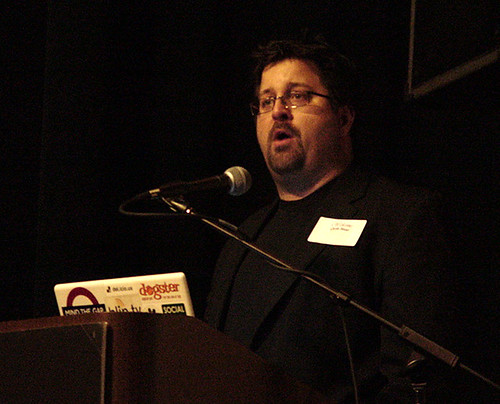Episode three of the “Be the Voice” podcast stars two of the founders of The Conversation Group, Chris Heuer (Social Media Club) and Peter Hirshberg (Technorati).
Summary (Chris Heuer and Peter Hirshberg):
- A company with all its employees blogging and talking with customers is more powerful than its sales force.
- It’s important to give employees great work experiences, because they live in social networks and they will communicate that to others.
- “Tofu” are PR-crafted messages to bloggers that are targeted correctly, but have no basis for a relationship.
- Blogger relations is like a cocktail party: listen first and find a commonality to begin a relationship.
- You have to share the ideals and beliefs and what your audience cares about.
Subscribe to the podcast via iTunes
Subscribe to the Be the Voice blog
Full article:
 Driving up from a dinner and panel at the Building Blocks conference in San Jose, Chris Heuer of Social Media Club and The Conversation Group and Peter Hirshberg also of The Conversation Group and chairman of Technorati talked with me about engaging with your community. Both offer some amazing insight with regard to developing your voice, caring about what your audience cares about, and NOT just being an agent to deliver a message for a brand or company.
Driving up from a dinner and panel at the Building Blocks conference in San Jose, Chris Heuer of Social Media Club and The Conversation Group and Peter Hirshberg also of The Conversation Group and chairman of Technorati talked with me about engaging with your community. Both offer some amazing insight with regard to developing your voice, caring about what your audience cares about, and NOT just being an agent to deliver a message for a brand or company.
Traditionally, clients are major brands and through traditional advertising, marketing, and PR, they would create one-way positioning. The problem is brands in of themselves don’t create a voice. Rather individuals within an organization become the voice associated with the brand. Examples are Robert Scoble and Microsoft or Bob Lutz and GM. It puts a face on what is often a faceless or unapproachable organization. “Customers love to hear from the experts within brands,” said Hirshberg.
“The reason Sun loves it when all of its employees are bloggers is their view is ‘well if we have all of these touch points between our employees and our customers that is a hell of a lot more than our sales force or what we can do in broadcasting,'” said Hirshberg. Heuer admits that when The Conversation Group deals with clients that aren’t as advanced as Sun, they are hesitant. They’re concerned to support an environment where they have 50,000 employees speaking to their customers and they aren’t speaking on message.
Watch what you say around the office. Your coworkers are talking about your when they leave the office
 But the environment has become Enterprise 2.0: social media tools being used for communications inside and outside of the enterprise to improve communications and relations. As Hirshberg explained, employees can no longer be viewed as cogs in a machine. Your staffers live and breathe in social networks. And even though people talk about wanting to keep their work life and personal life separate, they really don’t and as a result it’s hard to keep those two worlds apart.
But the environment has become Enterprise 2.0: social media tools being used for communications inside and outside of the enterprise to improve communications and relations. As Hirshberg explained, employees can no longer be viewed as cogs in a machine. Your staffers live and breathe in social networks. And even though people talk about wanting to keep their work life and personal life separate, they really don’t and as a result it’s hard to keep those two worlds apart.
“One of the big things companies are beginning to understand is since your employees are always talking, you need to do great things to keep your employees excited and thrilled, so that’s what they project to the world,” Hirshberg advised, “Because if your employees turn on you, you can’t shut it up, the word will get out.”
It’s not new explained Heuer, “Individuals have always represented their companies. With social media it just becomes more visible.”
Your PR team has no relationship with bloggers, so why are they talking to them?
“If you want people to contribute and get involved, you need to ask them things,” said Hirshberg.
One thing that The Conversation Group does is blogger outreach, communicating with people who are creating content online that would have interest in the conversation or content The Conversation Group is producing on behalf of its clients. Heuer reasserts that the most important part of blogger outreach is the relationship, not just the relaying of information.
Heuer brings up two concepts, “tofu” and “bacon,” that have been bandied about in the blogger outreach community. “Tofu” is the process of studying the person’s blog and crafting a tailored message so that the communications is sound. It’s a common practice among PR agencies who send emails on behalf of their clients. The problem with “tofu”-style communications is there isn’t a basis for a relationship. “[Tofu] is crafted, it’s personalized, it’s made nutritious, but people don’t like the taste of it anyways,” Heuer explained. Conversely, “bacon” are the messages commonly seen on social networks that are a little big fatty and a little bit tasty. You’re drawn to them because they’re attractive to you personally, but only initially. So messages like “somebody just added you as a friend” or “somebody just posted a picture of you” are considered “bacon.”
“The first thing is the person who is doing the outreach better have his own reputation as someone who cares about the community and is an individual. Because if you’re just reaching out as an agent on behalf of an agency on behalf of another corporation and you don’t have a presence for people to turn to and say, ‘Oh, wow I really like this person,’ you’re really not going to be as effective,” advised Heuer, “Blogger outreach in general doesn’t work as effectively as people think it does. You really have to have those relationships within that community and an understanding of what those people care about.” Bloggers hate press releases and they hate being talked at.
Politics, the latest with Paris and Britney, and more conversation starters with bloggers
Hirshberg explains blogger relations is like going to a cocktail party. You don’t just barge in and announce who you are and what you’re doing. Rather you listen, and find a point of commonality and a reason to relate.
Bloggers write about what they care about, and they often do it for free. They’re not beholden to some other editorial mandate that dictates what they can and can’t write about. That’s why they respond positively to people who show interest in their work and develop a relationship with them.
“As soon as it’s me talking to you, trying to get you to do something as opposed to me just talking to you, it changes the dynamics of the relationship,” warned Heuer of the traditional PR process of “flacking” bloggers and press. You need to extend invitations to participate, and return the favor by letting bloggers know what you’re going to do for them and their readers in return.
“The question is how do you build something that folks care about and will naturally spread as opposed to something that people feel like they need to be badgered into doing,” asked Hirshberg, “At the end of the day, all this outreach stuff is like kindling. You work very few people and you hope it will multiply.”
Chris Heuer brought up the issue of the “end of messaging” which is an issue that Chris Peterson of Chautauqua Communications (now part of the R2C group) agrees with. But Peterson believes it’s all about story. Heuer says it’s all about how do we get the “gist” across. It’s beyond the message, and it’s the goal of the story. That’s because depending on who you speak to, the message needs to be tailored differently because each person or category of people have different needs.
What’s “The Big Ideal?”
Hirshberg brought up Ogilvy’s theory of marketing that we’re trending away from “The Big Idea” to “The Big Ideal.” “‘The Big Ideal’ has to do with the fact that to break through clutter today you actually have to share the ideals and beliefs and what your audience cares about, because people really pay attention to what they care about,” said Hirshberg, “If your communications is based on siding with, amplifying, supporting, throwing attention on the ideals of what your audience cares about, they’re more likely to pay attention to you and spread the message.” Most common in this space today are companies that rally around “green” issues.
It’s beneficial to your bottom line and it can reduce costs. “The more excited they are the less your advertising budget needs to be because they’re going to do the advertising via word of mouth for you,” explained Heuer. This is what happened when Nike+ created an environment for others to communicate. It was so successful reaching their audience that they were able to cut their TV ad budget by tens of millions in one year.



